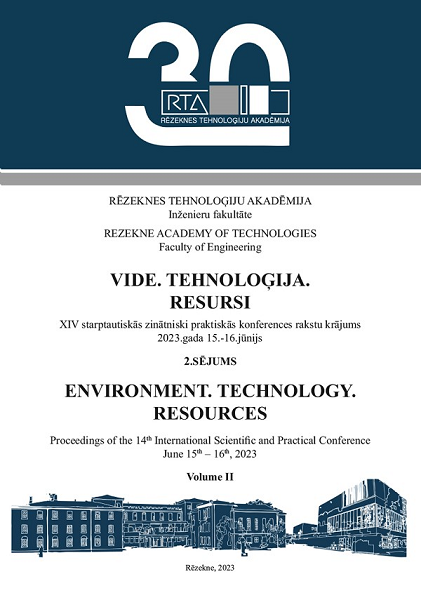STUDENTS’ FINANCIAL LITERACY KNOWLEDGE RESEARCH: THE CASE OF KAUNO KOLEGIJA HIGHER EDUCATION INSTITUTION
DOI:
https://doi.org/10.17770/etr2023vol2.7266Keywords:
budget, credits, investments, students’ financial literacyAbstract
A person feels more confident and secure with good financial skills and knowledge in the face of increased inflation, energy crisis and geopolitical uncertainty. Therefore, financial literacy is one of the most important skills necessary for a modern person. The basics of financial literacy are included in the programs of primary and secondary schools in Lithuania. So, students of Higher Education Institutions should have basic financial literacy knowledge and skills. The purpose of this study is to assess student’s level of financial literacy. For this reason, a survey of 1st year students of Kauno kolegija Higher Education Institution Technologies and Business Faculties was carried out in May – June of 2022. The survey consisted of questions and knowledge test tasks which were divided into four groups: budget, credits and debts, savings and investments, financial responsibility. The collected data were processed using the SPSS 29 software. It was assessed that the level of financial literacy of Kauno kolegija Higher Education Institution students is adequate. The quartile width of the financial literacy index of all respondents was about half of the total spread. That means that the spread of values between the quartiles is similar. It was observed that earning respondents are more tend to save than non-earning respondents when evaluating the differences in the context of saving habits. In addition, two-thirds of working students cut back on spending when money is tight. It was observed that the vast majority of working students do not tend to borrow from family or friends. A statistically reliable difference was obtained between the groups of working and non-working respondents when evaluating an investment, i.e. one third of working people tend to invest. Respondents named the main reasons for not investing: lack of knowledge and insufficient amount of money. Respondents who invest their savings usually choose to invest in cryptocurrencies, real estate, investment funds or their own business. Even four-fifths of unemployed students said that they wanted to learn more about money management when assessing their financial skills. The study found out that goal setting has a direct impact on reducing their expenses. In addition, a better financial situation makes it possible to regularly save and evaluate the financial situation before buying an expensive item. What is more, the ability to manage your finances directly depends on deepening your financial knowledge, encouraging you to compare prices when buying something, compare the conditions of different credit institutions. The received results show that the majority of Kauno kolegija Higher Education Institution students have a sufficient amount of general financial literacy knowledge, for example, they tend to plan their personal budget, borrow efficiently, correctly assess investment risks, inflation and interest rates, and have long-term financial goals.
References
K. Taujanskaitė, “Finansinis raštingumas – kam jis reikalingas?” 2021-08-12. [Online]. Available: https://www.lrt.lt/naujienos/verslo-pozicija/692/1467548/kamile-taujanskaite-finansinis-rastingumas-kam-jis-reikalingas. [Accessed: January 7, 2023].
OECD, “Pisa 2021 financial literacy analytical and assessment framework”, April 2019. [Online]. Available: https://www.oecd.org/pisa/sitedocument/PISA-2021-Financial-Literacy-Framework.pdf. [Accessed: January 15, 2023].
L. Klapper, A. Lusardi and P. van Oudheusden, “Financial Literacy Around the World”. [Online]. Available: https://gflec.org/wp-content/uploads/2015/11/3313-Finlit_Report_FINAL-5.11.16.pdf?x73794. [Accessed: January 16, 2023].
OECD, “OECD / INFE 2020 International Survey of Adult financial Literacy”, August 12, 2021. [Online]. Available: https://www.oecd.org/financial/education/oecd-infe-2020-international-survey-of-adult-financial-literacy.pdf. [Accessed: January 20, 2023].
S. K. Agarwalla, S.K. Barua, J. Jacob, and J. R. Varma, “Financial literacy among working young in urban India”, Indian Institute of Management Ahmedabad, Working Paper No. 2013-10-02, 2013, https://doi.org/10.1016/j.worlddev.2014.10.004 pp. 101-109.
A. García-Santillán, L. Navarro-Ibarra, V. S. Molchanova and D. L. Q. Castro, “Financial Literacy Level: An Emparical Study on Savings, Credit and Budget Management Habits in High School Students”, European Journal of Contemporary Education, 2021, 10 (4), e_ISSN 2305-6746, pp. 897-911.
A. A. Hung, A. M. Parker, J. and Yoong, J., “Defining and measuring financial literacy”, Social Science Research Network, Working Paper No 708, RAND Corporation, Santa Monica, CA, 2009. [Online]. Available: https://www.rand.org/content/dam/rand/pubs/working_papers/2009/RAND_WR708.pdf. [Accessed: January 20, 2023].
S. Huston, “Measuring Financial Literacy: a literature revie”, The Journal of Consumer Affairs, vol. 44, issue 2, Special Issue: Financial Literacy, 2010, pp. 296-316.
S. Kendirli, M. S. Kaya, M, A. Isleyen, “Determination of Financial Literacy Level: A Study on Hitit University Faculty of Economics and Administrative Sciences Students”, Journal of Economic Development, Environment and People, vol. 10, issue 4, online ISSN 2285-3642, ISSN-L 2285-3642, 2021, pp.29-41
Vilnius Gediminas Technical University, “VGTU profesorė Jelena Stankevičienė: „Žmonėms trūksta finansinio raštingumo dėl dviejų priežasčių“. [Online]. Available: https://vilniustech.lt/vilnius-tech-naujienu-portalas/naujienos/vgtu-profesore-jelena-stankeviciene-zmonems-truksta-finansinio-rastingumo-del-dvieju-priezasciu/246059?nid=305208. [Accessed: January 25, 2023].
Lietuvos bankų asociacija, “Lietuvos finansinio raštingumo indeksas: situacija gerėja, tačiau progresas per lėtas”. [Online]. Available: https://www.lba.lt/lt/apie-mus/asociacijos-naujienos/lietuvos-finansinio-rastingumo-indeksas-situacija-gereja-taciau-progresas-per-letas. [Accessed: January 20, 2023].
Lietuvos bankas, “Visuomenės finansinio švietimo 2017 – 2021 m. planas”. April 1, 2021. [Online]. Available: https://www.lb.lt/uploads/documents/files/Visuomen%C4%97s%20finansinio%20%C5%A1vietimo%202017%E2%80%932021%20m_%20planas(1).pdf. [Accessed: January 20, 2023].
J. Fernando, “What is financial literacy, and Why is it so important”, updated August 15, 2022. [Online]. Available: https://www.investopedia.com/terms/f/financial-literacy.asp. [Accessed: January 20, 2023].
Evrfi from Blackbaud, “Financial Literacy for Kids, Too? Definitely, Here‘s Why”. [Online]. Available: https://everfi.com/k-12/financial-education-literacy/elementary-school/#:~:text=While%20we%20know%20that%20financial%20literacy%20is%20undeniably,are%20typically%20in%20first%20through%20sixth%20grade.%20. [Accessed: January 20, 2023].
Švietimo, mokslo ir sporto ministerija, “Finansinio raštingumo ugdymas Lietuvoje: koks jis? Ką reikėtų tobulinti?”, Švietimo problemos analizė, nr. 12 (190), 2020-12, ISSN 2669-0977.
A. Lusardi, O. S. Mitchell, “The Economic Importance of Financial Literacy: Theory and Evidence”, Journal of Economic Literature, 52(1), 2014, pp. 5-44
Vilnius Gediminas Technical University, “National economic exam”. [Online]. Available: https://ekonomikosegzaminas.lrt.lt/. [Accessed: March 22, 2023].
Swedbank bankas, “Pasimatuok savo finansinį IQ!”. [Online]. Available: https://blog.swedbank.lt/finansinio-iq-testas. [Accessed: April 3, 2022].
Virginia Tech; “College student financial literacy survey”. [Online]. Available: https://vtechworks.lib.vt.edu/bitstream/handle/10919/35407/CSFLC_Survey.pdf. [Accessed: April 3, 2022].
OECD, “International Network on Financial Education, Measuring Financial Literacy: Questionnaire and Guidance Notes for Conducting an Internationally Comparable Survey of Financial Literacy”. [Online]. Available: https://www.oecd.org/finance/financial-education/49319977.pdf. [Accessed: April 3, 2022].
South Seattle Community College, “Student Financial Literacy Survey”. [Online]. Available: https://www.surveymonkey.com/r/VRFN7T3. [Accessed: April 3, 2022].
A. C. G. Potrich, K. M. Vieira, and W. Mendes-Da-Silva, “Development of a financial literacy model for university students”, Management Research Review, vol. 39 No. 3, 216, 2015, pp. 356-376



